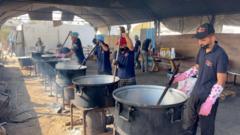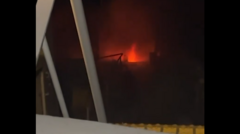As the war in Gaza persists, a growing number of Israeli reservists have signed letters urging Prime Minister Netanyahu to seek peace instead of prolonging conflict, emphasizing the need to prioritize the return of hostages.
Rising Dissent Among Israeli Reservists Against Continued Gaza War

Rising Dissent Among Israeli Reservists Against Continued Gaza War
Thousands of reservists voice their opposition to the ongoing conflict, urging the government to prioritize hostages’ release over military actions.
The conflict in Gaza has triggered a wave of dissent among Israeli reservists, with many now openly opposing the ongoing military operations. In recent weeks, thousands of reservists from various branches of the Israel Defense Forces (IDF) have penned letters urging Prime Minister Benjamin Netanyahu's administration to shift its focus from warfare to negotiations for the release of 59 hostages held by Hamas. Initially, public support for the war was high, framed by the desire to defeat Hamas and rescue the captured individuals.
However, hope for a ceasefire in January faded after a resumption of hostilities in mid-March. Disillusioned military figures like Danny Yatom, a former head of Mossad, express concern that Netanyahu's decisions prioritize political survival over the lives of hostages. Many signatories of these letters are long-standing critics of the prime minister and participated in protests prior to the war, but Yatom emphasizes that his stance is rooted in national concern rather than personal politics.
The first call for peace came from 1,000 air force reservists in early April, emphasizing that prolonging the conflict undermines its original goals and threatens the lives of hostages. With signatures now exceeding 12,000 from various military branches, the movement gains traction as awareness of declining reserve participation grows, reportedly dropping to around 50-60%.
As articulately noted by reservists like "Yoav," a participant in previous operations in Gaza, the initial belief in a just cause has faded. He now contend that the fight against Hamas is overshadowed by a larger danger of losing national identity. Critics within the military community, including retired generals, are raising alarms about potential war crimes, suggesting that some officers should contemplate disobeying orders if they are deemed unethical.
Despite widespread protests calling for hostages' release, Netanyahu has dismissed the initiatives, labeling them as fringe propaganda. Nonetheless, recent public sentiment indicates a clear demand for a ceasefire and negotiations. The protests, often displaying poignant imagery of both hostages and Palestinian casualties, reflect an increasingly critical view of ongoing military actions in Tel Aviv and beyond, even in the face of police attempts to suppress such sentiments.
As the situation unfolds, the prime minister remains steadfast in his assertion that military pressure is essential for bringing hostages home, even as dissenting voices within the military grow louder.


















